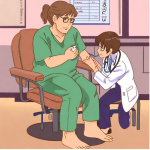Dive into the revolutionary world of CT scans in our latest blog post, where cutting-edge technology meets cancer care. Uncover how these detailed 3D images become a crucial ally in detecting, staging, and treating cancer, with advancements that promise safer, faster, and more precise diagnostics. From understanding how CT scans work to interpreting your results and navigating treatment options, we equip you with the knowledge to face your journey with confidence. Join us as we explore the indispensable role of CT scans in transforming cancer diagnosis and treatment, offering a beacon of hope for patients and healthcare providers alike.
Introduction
Imagine a technology that lets doctors see inside your body with such precision that even the smallest anomaly can’t hide. CT (Computed Tomography) scans do just that, offering a 3D view of your organs, bones, and blood vessels within credible detail. In the realm of cancer detection and treatment, CT scans are in valuable, providing insights that can literally save lives. Let’s explore how this sophisticated imaging technique has become a cornerstone in the battle against cancer.
Background and Importance
CT scans combine the power of X-ray technology with computer processing to create detailed cross-sectional images of the body. This allows for the early detection of cancer, including its size, shape, and exact location, as well as how well it’s responding to treatment. In the journey of cancer care, from diagnosis to treatment planning and monitoring, CT scans are indispensable. Their ability to uncover the unseen makes them a critical tool in diagnosing and combating various types of cancer.
Key Concepts and Terminology
- CT Scan (Computed Tomography): An imaging procedure that uses X-rays and computer technology to create detailed pictures of the body’s interior.
- Contrast Material: A dye used in some CT scans to highlight specific areas inside the body, improving the clarity of the images.
- Tumor Staging: The process of determining the size of a tumor, how deeply it has penetrated tissues, and whether it has spread to other parts of the body.
Recent Advancements
Recent advancements in CT technology include higher resolution imaging, reduced radiation exposure, and faster scan times, making the procedure safer and more comfortable for patients. Additionally, the integration of AI and machine learning has improved the analysis of images, helping radiologists detect abnormalities more accurately and efficiently. Dual-energy CT scans, another innovation, use two different X-ray energies to better differentiate between tissues, enhancing tumor detection and characterization.
Practical Advice and Tips
- Preparation: Follow your doctor’s instructions closely, especially if you need to fast or take a contrast material before the scan.
- Communication: Inform your healthcare provider if you have allergies, kidney problems, or are pregnant.
- Post-Scan Care: Drink plenty of fluids to help flush any contrast material from your body.
How to Interpret Test Results
CT scan results can reveal a variety of findings, from benign conditions to potential signs of cancer. A radiologist will analyze the images to identify any abnormalities, such as tumors, and assess their characteristics. These results are critical for developing an effective treatment plan, making understanding your scan an essential part of your care journey.
Questions to Ask Your Oncologist
- What do the CT scan results show about my condition?
- How will these findings affect my treatment plan?
- Are there additional tests or scans needed?
- How can I manage any side effects from the scan?
Conclusion
CT scans are a pivotal element in modern cancer care, offering a window into the body that reveals the critical details needed for effective diagnosis and treatment. As technology advances, these scans continue to evolve, becoming safer and more precise, helping to tailor treatments to individual patients and improve outcomes. By understanding the role of CT scans in your cancer care journey, you’re better equipped to navigate the challenges ahead with confidence and clarity.
References and Further Reading
- The American Cancer Society (cancer.org)
- Radiological Society of North America (rsna.org)
- National Cancer Institute (cancer.gov)
Armed with this knowledge, patients and their families can approach CT scans as an empowered part of their cancer care team, understanding their purpose, process, and potential in the fight against cancer.



